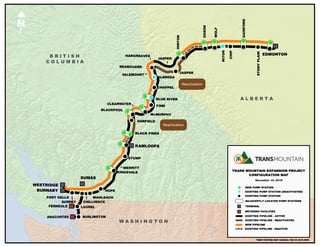The Trans Mountain Pipeline System, or simply the Trans Mountain Pipeline (TMPL), is a multiple product pipeline system that carries crude and refined products from Edmonton, Alberta to the coast of British Columbia, Canada. In 2018, the Government of Canada purchased the pipeline for $4.5 billion from Kinder Morgan through the creation of the Trans Mountain Corporation (TMC), in order to "keep the project alive". TMC is a Crown corporation, a subsidiary of the Canada Development Investment Corporation (CDEV). Until the August 31, 2018 purchase by CDEV, the Trans Mountain Pipeline was owned by the Houston, Texas-based pipeline operator's Canadian division. The pipeline has been in use since 1953. It is the only pipeline to run between these two areas. The construction of a second pipeline between Hinton, Alberta, and Hargreaves, British Columbia, running adjacent to the existing line, was completed in 2008. In 2013, a project to twin the existing Trans Mountain pipeline—the Trans Mountain Expansion Project—was proposed to the Canadian National Energy Board. The project was 75% complete, as of January 2023. The expansion, which runs roughly parallel to the existing pipeline, will increase capacity from 300,000 barrels per day (48,000 m3/d) to 890,000 barrels per day (141,000 m3/d). Since it was first proposed in 2013, this Trans Mountain Expansion Project has attracted controversy due to its potential environmental impact, having faced legal challenges, as well as protests from environmentalists and First Nations groups. A July 2, 2020 Supreme Court decision that rejected the appeals made by First Nations and environmental groups, "[brought] an end to the years-long legal challenge". From Wikipedia
